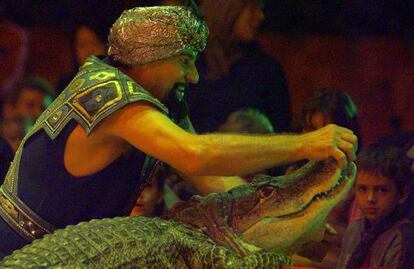Catalonia to become first Spanish region to ban circus acts with live animals
99 Catalan municipalities already have similar law in place

Catalonia will soon become the first Spanish region to ban circus acts with live animals. On Tuesday, five of the seven political groups in the regional assembly proposed to extend existing animal protection laws to “circus acts with animals, across the Catalan territory.”
The five groups that put forward the bill had made a campaign promise to the animal rights association Libera, whose president Carlos López expressed satisfaction at the initiative and praised that fact that “once again, the Catalan parliament is leading the fight in defense of animal rights.”
According to López, Catalonia will be the first Spanish region to prohibit the use of animals in circus acts, although 99 municipalities in the region already have a similar ban in place. Across Spain this figure rises to 133.
Josep Rull, a deputy for the ruling CIU Catalan nationalist bloc, explained that these days the presence of circus acts that use animals was “completely residual.” Only one circus in the entire region still has animal acts, and it has not put on a show for over a year and a half. “Society has progressed, and with it levels of animal protection.”
Rull then quoted Gandhi’s famous phrase that “The greatness of a nation and its moral progress can be judged by the way its animals are treated,” and added that “with proposals like today’s, Catalonia comes closer to the rest of Europe.”
Oriol Amorós, a deputy for the ERC Catalan Republican Left, noted the historical evolution of animal protection in Catalonia, underscoring the ban on bullfighting and the fact that “the Catalan Civil Code is the first one to recognize that animals are not things, but sentient beings that require rights and protection.”
According to Amorós, the ban on circus acts with animals is justified because of “a long list of reports of abuse, since living conditions are much worse than at zoos,” especially since the animals are always travelling around, and ultimately abandoned “once they are no longer in a condition to be exploited.”
Despite the self-congratulatory tone, several representatives noted that there was still some way to go before animal welfare becomes truly universal in the region, highlighting the exceptions granted to the correbous (running of the bulls) and bous embolats (bulls with flammable material attached to their horns), two traditional practices still seen at local fiestas in Catalan towns. Bullfighting, on the other hand, is perceived by many Catalans as a purely Spanish tradition.
Tu suscripción se está usando en otro dispositivo
¿Quieres añadir otro usuario a tu suscripción?
Si continúas leyendo en este dispositivo, no se podrá leer en el otro.
FlechaTu suscripción se está usando en otro dispositivo y solo puedes acceder a EL PAÍS desde un dispositivo a la vez.
Si quieres compartir tu cuenta, cambia tu suscripción a la modalidad Premium, así podrás añadir otro usuario. Cada uno accederá con su propia cuenta de email, lo que os permitirá personalizar vuestra experiencia en EL PAÍS.
¿Tienes una suscripción de empresa? Accede aquí para contratar más cuentas.
En el caso de no saber quién está usando tu cuenta, te recomendamos cambiar tu contraseña aquí.
Si decides continuar compartiendo tu cuenta, este mensaje se mostrará en tu dispositivo y en el de la otra persona que está usando tu cuenta de forma indefinida, afectando a tu experiencia de lectura. Puedes consultar aquí los términos y condiciones de la suscripción digital.








































